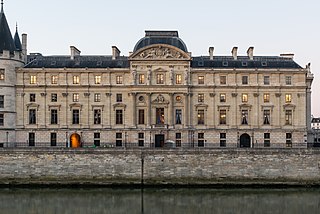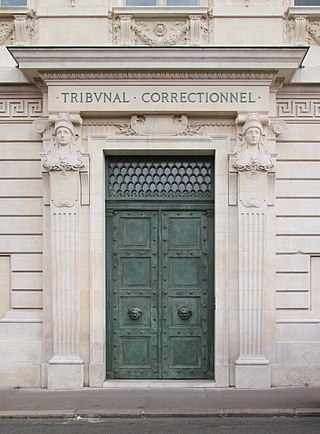
A judge is a person who presides over court proceedings, either alone or as a part of a panel of judges. In an adversarial system, the judge hears all the witnesses and any other evidence presented by the barristers or solicitors of the case, assesses the credibility and arguments of the parties, and then issues a ruling in the case based on their interpretation of the law and their own personal judgment. A judge is expected to conduct the trial impartially and, typically, in an open court.
In law, certiorari is a court process to seek judicial review of a decision of a lower court or government agency. Certiorari comes from the name of an English prerogative writ, issued by a superior court to direct that the record of the lower court be sent to the superior court for review. The term is Latin for "to be made more certain", and comes from the opening line of such writs, which traditionally began with the Latin words "Certiorari volumus...".

The Court of Cassation is the supreme court for civil and criminal cases in France. It is one of the country's four apex courts, along with the Council of State, the Constitutional Council and the Jurisdictional Disputes Tribunal.
The Courts of England and Wales, supported administratively by His Majesty's Courts and Tribunals Service, are the civil and criminal courts responsible for the administration of justice in England and Wales.

A tribunal, generally, is any person or institution with authority to judge, adjudicate on, or determine claims or disputes—whether or not it is called a tribunal in its title. For example, an advocate who appears before a court with a single judge could describe that judge as "their tribunal". Many governmental bodies are titled "tribunals" to emphasize that they are not courts of normal jurisdiction. For instance, the International Criminal Tribunal for Rwanda was a body specially constituted under international law; in Great Britain, employment tribunals are bodies set up to hear specific employment disputes.
Small-claims courts have limited jurisdiction to hear civil cases between private litigants. Courts authorized to try small claims may also have other judicial functions, and go by different names in different jurisdictions. For example, it may be known as a county or magistrate's court. These courts can be found in Australia, Brazil, Canada, England and Wales, Hong Kong, Ireland, Israel, Greece, New Zealand, Philippines, Scotland, Singapore, South Africa, Nigeria and the United States.

The Judiciary of the Hong Kong Special Administrative Region is the judicial branch of the Hong Kong Special Administrative Region. Under the Basic Law of Hong Kong, it exercises the judicial power of the Region and is independent of the executive and legislative branches of the Government. The courts in Hong Kong hear and adjudicate all prosecutions and civil disputes, including all public and private law matters.

In England and Wales, a magistrates' court is a lower court which hears matters relating to summary offences and some triable either-way matters. Some civil law issues are also decided here, notably family proceedings. In 2010, there were 320 magistrates' courts in England and Wales; by 2020, a decade later, 164 of those had closed. The jurisdiction of magistrates' courts and rules governing them are set out in the Magistrates' Courts Act 1980.
The courts of Northern Ireland are the civil and criminal courts responsible for the administration of justice in Northern Ireland: they are constituted and governed by the law of Northern Ireland.

The judicial system of Israel consists of secular courts and religious courts. The law courts constitute a separate and independent unit of Israel's Ministry of Justice. The system is headed by the President of the Supreme Court and the Minister of Justice.

The High Court of Singapore is the lower division of the Supreme Court of Singapore, the upper division being the Court of Appeal. The High Court consists of the chief justice and the judges of the High Court. Judicial Commissioners are often appointed to assist with the Court's caseload. There are two specialist commercial courts, the Admiralty Court and the Intellectual Property Court, and a number of judges are designated to hear arbitration-related matters. In 2015, the Singapore International Commercial Court was established as part of the Supreme Court of Singapore, and is a division of the High Court. The other divisions of the high court are the General Division, the Appellate Division, and the Family Division. The seat of the High Court is the Supreme Court Building.

The Court of Cassation of Belgium is the supreme court of the Belgian judiciary. The court is composed of thirty judges with life tenure who are nominated by the High Council of Justice of Belgium and appointed by the Belgian federal government. The court handles cases in the two main languages of Belgium, Dutch and French, and provides certain facilities for cases in German. The court is assisted in its work by a public prosecutor's office and a bar association, which both function separately from other structures. The duty of the public prosecutor's office is to provide advisory opinions to the court on how the law ought to be interpreted and applied. The attorneys of the court's bar association assist litigants in proceedings before the court; in certain cases, their assistance is mandatory.

The judiciary of Pakistan is the national system of courts that maintains the law and order in the Islamic Republic of Pakistan. Pakistan uses a common law system, which was introduced during the colonial era, influenced by local medieval judicial systems based on religious and cultural practices. The Constitution of Pakistan lays down the fundamentals and working of the Pakistani judiciary.
This article concerns the legal mechanisms by way of which a decision of an England and Wales magistrates' court may be challenged. There are four mechanisms under which a decision of a magistrates' court may be challenged:

The Judiciary of Spain consists of Courts and Tribunals, composed of judges and magistrates (Justices), who have the power to administer justice in the name of the King of Spain.
In 1964 Tanganyika and Zanzibar formed the United Republic of Tanzania. After the Treaty of the Union, the two countries continued to remain with their own legal systems including court structures. In the 1977 Constitution of the United Republic of Tanzania, the High Court of Tanganyika whose jurisdiction was and still is territoriality limited to Tanzania Mainland was called the High Court of Tanzania and the High Court of Zanzibar retained its original name. It is essential to note that the High Court of Tanzania only has territorial jurisdiction over legal issues arising in Tanzania Mainland and the High Court of Zanzibar has territorial jurisdiction over legal issues arising in Zanzibar.

The judiciary of Italy is composed of courts and public prosecutor offices responsible for the administration of justice in the Italian Republic. These offices are occupied by judges and prosecutors respectively, who are known as magistrates. Magistrates belong to the magistracy, that is to say a branch of the State that may only be accessed by Italian citizens who hold an Italian Juris Doctor and successfully partake in one of the relevant competitive public examinations organised by the Ministry of justice.

The judiciary of British Virgin Islands is based on the judiciary of the United Kingdom. The British Virgin Islands is a member state of the Eastern Caribbean Supreme Court. The courts are organized at four levels, including the provision for final appeal to the Judicial Committee of the Privy Council in London.

The law of Cyprus is a legal system which applies within the Republic of Cyprus. Although Cypriot law is extensively codified, it is still heavily based on English common law in the sense that the fundamental principle of precedent applies.

In France, the correctional court is the court of first instance that has jurisdiction in criminal matters regarding offenses classified as délits committed by an adult. In 2013, French correctional courts rendered 576,859 judgments and pronounced 501,171 verdicts.













